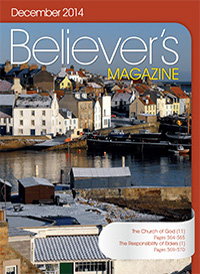The first visit of Paul to Ephesus, which was of short duration, is recorded in Acts 18.19-20. His second visit (Acts 19.1-20.1), for a period of over two years, was marked by fruitfulness in the work of the gospel. During his first imprisonment in Rome he wrote "to the saints which are at Ephesus, and to the faithful in Christ Jesus" (Eph 1.1), and was able to express good memories of them.
The content of the epistle takes the reader to high points in Christian experience. The Ephesians now knew that before they were saved they were "dead in trespasses and sins" and had "walked according to the course of this world, according to the prince of the power of the air, the spirit that now worketh in the children of disobedience" (2.1). The contrast now is very clear; they had been blessed "with all spiritual blessings in heavenly places in Christ" (1.3); they could rejoice that God "hath raised us up together, and made us sit together in heavenly places in Christ Jesus" (2.6); and it was "To the intent that now unto the principalities and powers in heavenly places might be made known by the church the manifest wisdom of God" (3.10).
Many readers have noted that in the early stages of the epistle all three persons in the Godhead took part in the work of salvation: "the…Father of our Lord Jesus Christ" (1.3), "Jesus Christ" (1.5), and the "holy Spirit of promise" (1.13). In such an epistle there is so much that can cause the reader to praise Him who is eternal in His being, God far above all. Little wonder that in the epistle there is an abundance to read and to be gripped by its content. Who would ignore the statements of the riches that the believer can now enjoy.
Consider the first statement: "In whom we have redemption through his blood, the forgiveness of sins, according to the riches of his grace" (1.7). Forgiveness is the remission of punishment due and "the removal of the cause of offence" (W E Vine). "The riches" are without bounds, indicating that the grace which is extended to the sinner is infinite and unlimited. The cost is the blood of the Lord Jesus shed at Calvary.
The second statement speaks of "the hope of his calling...the riches of the glory of his inheritance in the saints" (1.18). The spirit of wisdom and revelation will cause our understanding to be enlightened so that we may know what our hope is and how great is our inheritance.
The third statement speaks of "God, who is rich in mercy" (2.4). Not only is He rich in mercy, but the love that He has for a sinner is "great love". What a promise we have in v.6. We were dead in sins (v.5) but now He has made us sit together in heavenly places as those who will share the place of dignity and dominion.
The fourth statement is "That in the ages to come he might shew the exceeding riches of his grace" (2.7). For all succeeding ages, the magnitude and glory of His dealings with we who were unworthy sinners will display the surpassing greatness of His grace. Our works could achieve nothing, but by His workmanship we are created in Christ Jesus unto good works, which God had prepared for us. These are not the means of salvation but rather the result of salvation.
The fifth statement relates to the desire of Paul to preach the "unsearchable riches of Christ" (3.8). The word "unsearchable" is also found in Romans 11.33 as being "past finding out". What is indeed beyond man's full comprehension is the message which brings salvation.
The sixth statement is, "the riches of his glory" (3.16). The expression shows that Paul's prayer (vv.14-21) is that "he may give you according to the riches of his glory, to be strengthened with power by his Spirit in the inner man" (JND).
What wealth is available to those who put their trust in the Lord Jesus. The rich ambassador held in prison in Rome was truly wealthy beyond human understanding. The same spiritual treasure trove is open to the believer today to enjoy all that Father, Son and Holy Ghost have for us for all eternity. How great is the God whom we have come to know as we raise our voice in thanksgiving for the eternal riches which are ours, all of which we will enjoy fully because of Calvary.









